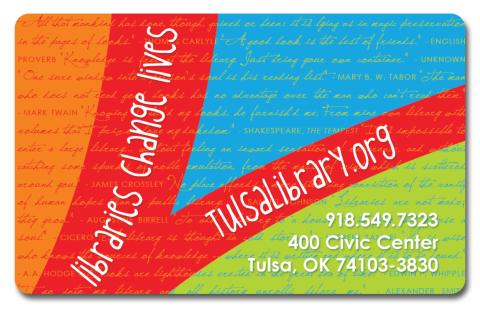
March 2016
Today’s multi-tasking world is filled with double-booked daily activities, keeping pace with emerging technologies and constant smart phone alerts from rampant social media updates. It’s important to step back, take a deep breath, and enjoy activities to refresh the inner calm.
Spring is the perfect time for families to observe the cycles of different plants and the beauty they share. Plant a seed, watch it grow. The idea seems simple enough. But wilted dreams of the best planned gardens are far too common in Oklahoma’s extreme temperatures.
To help grow more green thumbs and encourage healthier lifestyles, Tulsa City-County Library began the Seed Library in 2014. Customers can check out up to five packets of vegetable, herb or flower seeds per season that are best adapted for our area. If the plants are successful, growers are encouraged to let the best plants go to seed. Then they can the collect, dry, label and return the seeds to the library so the cycle will continue the following year.
Seed Library locations include four Tulsa City-County Libraries as well as the Bookmobile:
- Glenpool Library, 730 E. 141st St.
- Nathan Hale Library, 6038 E. 23rd St.
- Suburban Acres Library, 4606 N. Garrison
- Zarrow Regional Library, 2224 W. 51st
Librarians have prepared helpful information on the process of growing and storing seeds, guides.tulsalibrary.org/tulsaseedlibrary. This webpage features a comprehensive listing of all seeds ready for check out, along with planting instructions, seed saving basics and care. You can even check out a packet online and have it delivered to your community library.
The Seed Library is divided into three levels of saving difficulty.
- Easy: Beans, peas, lettuce, eggplant, and tomato. These seeds generally self-pollinate, and are easiest to harvest.
- Medium: Arugula, basil, cilantro, chives, nasturtium and peppers. These may self-pollinate or cross-pollinate and should be separated from other varieties by distance.
- Advanced: Broccoli, cabbage, corn, carrot, kale, okra, squash and Swiss chard. These plants are insect or wind-pollinated and cross with other varieties. To get true seeds separate varieties by time, distance or physical barriers.
With names like Cherokee Purple Tomatoes, Rattlesnake Green Beans and Cosmic Purple Carrots, all ages will enjoy watching these edible wonders reach for the sun. It’s also a fun activity for families to observe the daily changes in their garden, especially as vegetables ripen and become the next healthy snack.
The beauty of growing flowers as a home for butterflies is another great benefit of the Seed Library. By planting Asclepias tuberosa, or the Butterfly Milkweed, flowerbeds will be a welcoming zone for butterflies like the Monarch, whose numbers are declining from lack of habitat.
Library programs are regularly scheduled to keep families up-to-date on the latest tips and tricks to successfully grow home gardens. Mark your calendars for these upcoming programs.
- “Cherry Street Farmers’ Market,” April 2, 7-11 a.m., 15th and Peoria. Stop by Tulsa City-Count Library’s booth to check out seeds, get tips on growing and find additional library resources to improve your garden.
- “Preschool Gardening 101,” April 23, 2-3:30 p.m., South Broken Arrow Library, 3600 S. Chestnut. Bring your little gardeners to the library for a colorful bouquet of activities. Explore the basics of plant care using nature-themed songs, stories and crafts. Young learners will have the opportunity to continue cultivating their gardening skills by taking home a potted seed and watching it grow.
- “Plant Swap!” April 30, 1-4 p.m., Kendall-Whittier Library, 21 S. Lewis. Too much lavender? Not enough basil? Bring any plants, starts, seedlings, cuttings, bulbs, tools or garden materials you have to share. You also can check out and donate seeds with the Seed Library. This event is hosted by the TCCL Seed Library and Tulsa Seed Commons.
So this spring, visit a Seed Library and discover an activity your family will truly dig. And they will certainly eat up the results.
# # #